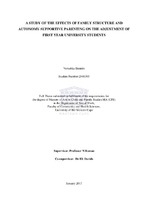The effects of family structure and autonomy-supportive parenting on the adjustment of first year university students
Abstract
The first year of university studies is usually accompanied by many new experiences, often stressful, and family members fulfil a significant role in helping to reduce students' stress and facilitate their adjustment. Research has indicated that the overall first year experience sets the tone for the subsequent well-being of students both academically and personally, and if this is negative then the university dropout rates are likely to remain high. This study seeks to determine the effects of family structure and parental autonomy-support on students' adjustment during the first year of university. The study employed a quantitative, cross-sectional correlational research design. Participants were selected by means of convenient sampling, and only consisted of first year university students between the ages of 18 and 25 years who were registered at the University of the Western Cape. Data was collected via an online survey consisting of three self-reported questionnaires, namely the perceived parental autonomy-support scale, the college adaptation questionnaire, and also demographic information. Data was analysed using the Statistical Package for the Social Sciences. Participants' right to privacy, confidentiality and anonymity was observed throughout the study. The results suggest that students from two-parent families are better adjusted than students from one-parent families. Furthermore, results of the total sample suggest a significant relationship between good adjustment and autonomy-supportive parenting, while a significant negative relationship exists between poor adjustment and autonomy-supportive parenting. When determining the separate results for two-parent families and one-parent families, it was established from the regression analysis that good adjustment was only predicted by mother autonomy-support in two-parent families, accounting for 7% of the variance. Poor adjustment in two-parent families was negatively predicted by mother and father autonomy-support, and was accounted for by 11% of variance. In one-parent families, neither good nor poor adjustment was predicted by parenting behaviours.

